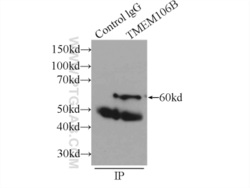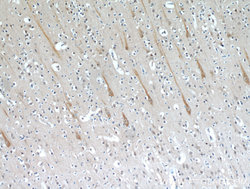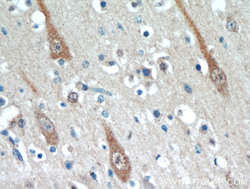Antibody data
- Antibody Data
- Antigen structure
- References [9]
- Comments [0]
- Validations
- Western blot [1]
- Immunoprecipitation [1]
- Immunohistochemistry [2]
Submit
Validation data
Reference
Comment
Report error
- Product number
- 20995-1-AP - Provider product page

- Provider
- Proteintech Group
- Proper citation
- Proteintech Cat#20995-1-AP, RRID:AB_10694293
- Product name
- TMEM106B antibody
- Antibody type
- Polyclonal
- Description
- TMEM106B antibody (Cat. #20995-1-AP) is a rabbit polyclonal antibody that shows reactivity with human, mouse and has been validated for the following applications: IF, IHC, IP, WB,ELISA.
- Reactivity
- Human, Mouse
- Host
- Rabbit
- Conjugate
- Unconjugated
- Isotype
- IgG
- Vial size
- 20ul, 150ul
Submitted references SLC34A2 promotes cell proliferation by activating STX17-mediated autophagy in esophageal squamous cell carcinoma.
Progranulin haploinsufficiency mediates cytoplasmic TDP-43 aggregation with lysosomal abnormalities in human microglia.
TMEM106B Puncta Is Increased in Multiple Sclerosis Plaques, and Reduced Protein in Mice Results in Delayed Lipid Clearance Following CNS Injury.
Superresolution live-cell imaging reveals that the localization of TMEM106B to filopodia in oligodendrocytes is compromised by the hypomyelination-related D252N mutation.
Homotypic fibrillization of TMEM106B across diverse neurodegenerative diseases.
Construction of ceRNA network to identify the lncRNA and mRNA related to non-small cell lung cancer.
TMEM106B, a frontotemporal lobar dementia (FTLD) modifier, associates with FTD-3-linked CHMP2B, a complex of ESCRT-III.
TMEM106B expression is reduced in Alzheimer's disease brains.
TMEM106B, the risk gene for frontotemporal dementia, is regulated by the microRNA-132/212 cluster and affects progranulin pathways.
Xu Y, Duan S, Ye W, Zheng Z, Zhang J, Gao Y, Ye S
Thoracic cancer 2024 Jun;15(17):1369-1384
Thoracic cancer 2024 Jun;15(17):1369-1384
Progranulin haploinsufficiency mediates cytoplasmic TDP-43 aggregation with lysosomal abnormalities in human microglia.
Sung W, Noh MY, Nahm M, Kim YS, Ki CS, Kim YE, Kim HJ, Kim SH
Journal of neuroinflammation 2024 Feb 13;21(1):47
Journal of neuroinflammation 2024 Feb 13;21(1):47
TMEM106B Puncta Is Increased in Multiple Sclerosis Plaques, and Reduced Protein in Mice Results in Delayed Lipid Clearance Following CNS Injury.
Shafit-Zagardo B, Sidoli S, Goldman JE, DuBois JC, Corboy JR, Strittmatter SM, Guzik H, Edema U, Arackal AG, Botbol YM, Merheb E, Nagra RM, Graff S
Cells 2023 Jun 27;12(13)
Cells 2023 Jun 27;12(13)
Superresolution live-cell imaging reveals that the localization of TMEM106B to filopodia in oligodendrocytes is compromised by the hypomyelination-related D252N mutation.
Xing S, Zheng X, Yan H, Mo Y, Duan R, Chen Z, Wang K, Gao K, Chen T, Zhao S, Wang J, Chen L
Science China. Life sciences 2023 Aug;66(8):1858-1868
Science China. Life sciences 2023 Aug;66(8):1858-1868
Homotypic fibrillization of TMEM106B across diverse neurodegenerative diseases.
Chang A, Xiang X, Wang J, Lee C, Arakhamia T, Simjanoska M, Wang C, Carlomagno Y, Zhang G, Dhingra S, Thierry M, Perneel J, Heeman B, Forgrave LM, DeTure M, DeMarco ML, Cook CN, Rademakers R, Dickson DW, Petrucelli L, Stowell MHB, Mackenzie IRA, Fitzpatrick AWP
Cell 2022 Apr 14;185(8):1346-1355.e15
Cell 2022 Apr 14;185(8):1346-1355.e15
Construction of ceRNA network to identify the lncRNA and mRNA related to non-small cell lung cancer.
Xiao K, Wang Y, Zhou L, Wang J, Wang Y, Tong D, Zhu Z, Jiang J
PloS one 2021;16(10):e0259091
PloS one 2021;16(10):e0259091
TMEM106B, a frontotemporal lobar dementia (FTLD) modifier, associates with FTD-3-linked CHMP2B, a complex of ESCRT-III.
Jun MH, Han JH, Lee YK, Jang DJ, Kaang BK, Lee JA
Molecular brain 2015 Dec 10;8:85
Molecular brain 2015 Dec 10;8:85
TMEM106B expression is reduced in Alzheimer's disease brains.
Satoh J, Kino Y, Kawana N, Yamamoto Y, Ishida T, Saito Y, Arima K
Alzheimer's research & therapy 2014;6(2):17
Alzheimer's research & therapy 2014;6(2):17
TMEM106B, the risk gene for frontotemporal dementia, is regulated by the microRNA-132/212 cluster and affects progranulin pathways.
Chen-Plotkin AS, Unger TL, Gallagher MD, Bill E, Kwong LK, Volpicelli-Daley L, Busch JI, Akle S, Grossman M, Van Deerlin V, Trojanowski JQ, Lee VM
The Journal of neuroscience : the official journal of the Society for Neuroscience 2012 Aug 15;32(33):11213-27
The Journal of neuroscience : the official journal of the Society for Neuroscience 2012 Aug 15;32(33):11213-27
No comments: Submit comment
Supportive validation
- Submitted by
- Proteintech Group (provider)
- Main image

- Experimental details
- mouse brain tissue were subjected to SDS PAGE followed by western blot with 20995-1-AP(TMEM106B antibody) at dilution of 1:2000
- Sample type
- tissue
Supportive validation
- Submitted by
- Proteintech Group (provider)
- Main image

- Experimental details
- IP Result of anti-TMEM106B (IP:20995-1-AP, 3ug; Detection:20995-1-AP 1:1000) with mouse brain tissue lysate 6000ug.
- Sample type
- tissue
Supportive validation
- Submitted by
- Proteintech Group (provider)
- Main image

- Experimental details
- Immunohistochemical of paraffin-embedded human brain using 20995-1-AP(TMEM106B antibody) at dilution of 1:100 (under 10x lens)
- Sample type
- tissue
- Submitted by
- Proteintech Group (provider)
- Main image

- Experimental details
- The TMEM106B antibody from Proteintech is a rabbit polyclonal antibody to a fusion protein of human TMEM106B. This antibody recognizes human, mouse antigen. The TMEM106B antibody has been validated for the following applications: ELISA, WB, IHC, IP analysis.
 Explore
Explore Validate
Validate Learn
Learn Western blot
Western blot ELISA
ELISA